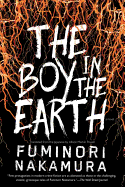
The unnamed protagonist in Fuminori Nakamura's The Boy in the Earth is struggling with depression and despair. On the days he manages to show up to work, he drives a cab aimlessly around Tokyo; on the days he stays home, he contemplates the many ways he could die. "My own existence was futile, utterly powerless--even if I devoted my entire being I couldn't leave the slightest mark on this world."
There's very little in the way of plot, making Nakamura's short book read more like a character study than a traditional novel. That's not to suggest that it's dull, however. Its lack of plot proves compelling from the very start, and its occasional aimlessness and moody darkness feels true to the main character's inner thoughts and feelings.
An impending sense of doom and violence pervades The Boy in the Earth: the taxi driver is robbed at knifepoint, contemplates killing himself and reflects on the horrible abuse he suffered at the hands of his adoptive family as a child. Though these trials are particular to this character, Nakamura's telling of them makes the taxi driver's troubles feel universal. To what lengths will an individual go to survive? What makes that survival meaningful? Who--and what--matters? Who does not? Translated from Japanese by Allison Markin Powell, The Boy in the Earth offers readers a darkly philosophic musing on violence, history, purpose and what it means to be alive, told in elegant prose. --Kerry McHugh, blogger at Entomology of a Bookworm

